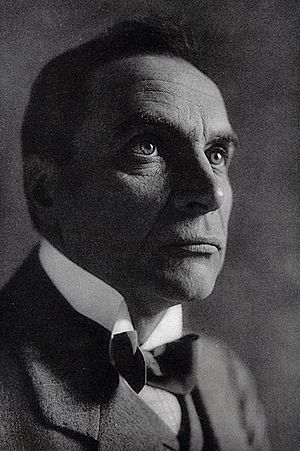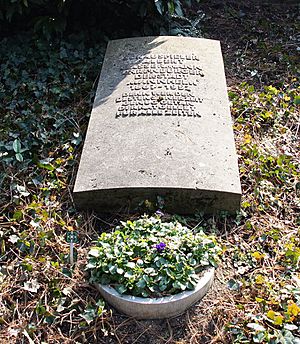Albert Bassermann facts for kids
Quick facts for kids
Albert Bassermann
|
|
|---|---|

Bassermann in 1918
|
|
| Born | 7 September 1867 |
| Died | 15 March 1952 (aged 84) en route to Zurich, Switzerland
|
| Occupation | Screen, stage actor |
| Years active | 1887–1948 |
| Spouse(s) |
Elsa Schiff
(m. 1908) |
Albert Bassermann (born September 7, 1867 – died May 15, 1952) was a very talented actor from Germany. He performed both on stage and in movies. Many people thought he was one of the best German-speaking actors of his time. He even received a special award called the Iffland-Ring, which is given to the most important German-speaking male actor. Albert Bassermann was married to Elsa Schiff, who was also an actress. They often acted together.
Contents
Life and Career
Albert Bassermann started acting in 1887 in his hometown, Mannheim. Before that, he briefly studied chemistry. Later, he moved to Berlin to continue his acting career.
Early Stage Work
From 1899, Bassermann worked with a famous director named Otto Brahm. In 1904, he joined the Deutsches Theater Berlin. This was the same year his future wife, Elsa Schiff, also started working there.
They got married in 1908. The next year, he began working at the Lessing Theatre. He also kept performing at the Deutsches Theater with director Max Reinhardt until 1915.
Bassermann played many important roles on stage. He was Othello in 1910 and played Faust in Faust Part II in 1911. He also acted as Shylock in The Merchant of Venice.
Moving to Film
Bassermann was one of the first German stage actors to also work in movies. In 1913, he starred in the film Der Andere. He also worked with well-known silent film directors like Ernst Lubitsch.
In 1928, he appeared in the first stage show of Katharina Knie.
Leaving Germany
In 1933, Bassermann left Germany. He first lived in Switzerland and then moved to the United States in 1938. He left Germany because of the political situation at the time. His wife, Elsa, was Jewish, and the government in Germany was against Jewish people.
A fellow actress, Annija Simsone, wrote about this. She said that Albert Bassermann was told he would have to divorce his wife if he wanted to keep acting in Germany. He refused to divorce Elsa, and they moved away together.
Acting in Hollywood
Even though Bassermann did not speak much English, he learned his lines by listening carefully. His wife helped him. He became a popular character actor in Hollywood films.
In 1940, he was nominated for an Academy Award for Best Supporting Actor. This was for his role as Van Meer in Alfred Hitchcock's movie Foreign Correspondent.
He returned to Europe in 1946. His last movie was The Red Shoes.
A Lesson from a Master
The famous actress Uta Hagen shared a story about working with Albert Bassermann. She said he taught her a great lesson. Even though he was over 80, he was very modern in his acting.
Uta Hagen noticed that Bassermann was always "in character." He never stopped acting, even when it was her turn to speak. He taught her that an actor should always be thinking and reacting, not just waiting for their turn. He told her, "I'm never through! And neither should you be!"
Death
Albert Bassermann passed away on May 15, 1952. He died near the Zurich Airport in Switzerland, right after arriving from the United States. He is buried in his hometown of Mannheim, Germany.
Filmography
| Year | Title | Role | Notes |
|---|---|---|---|
| 1913 | Der Andere | Dr. Hallers | The Other |
| Der König | Provinzschauspieler | ||
| Der letzte Tag | Professor Osterode | ||
| 1914 | Urteil des Arztes | Dr. Erwin Hofmüller | |
| 1917 | Du sollst keine anderen Götter haben | ||
| Der eiserne Wille | Hausierer David | ||
| Herr und Diener | |||
| 1918 | Father and Son | ||
| The Zaarden Brothers | |||
| Doctor Schotte | |||
| Lorenzo Burghardt | |||
| 1919 | Eine schwache Stunde | ||
| Das Werk seines Lebens | Peter | ||
| 1920 | Die Duplizität der Ereignisse | ||
| The Voice | |||
| The Sons of Count Dossy | The Count/The Thief's Son | ||
| Masks | |||
| Dolls of Death | |||
| 1921 | Der Frauenarzt | Dr. Wolfgang Holländer | |
| The Nights of Cornelis Brouwer | Cornelis Brouwer | ||
| Burning Country | |||
| The Last Witness | Olaf Baggerson | ||
| Die kleine Dagmar | |||
| 1922 | Frauenopfer | Graf | Women's Sacrifice |
| The Loves of Pharaoh | Sothis | ||
| Lucrezia Borgia | Pope Alexander VI | ||
| 1923 | The Man in the Iron Mask | Cardinal Mazarin | The Man with the Iron Mask |
| Earth Spirit | Dr. Schoen | ||
| Christopher Columbus | Columbus | ||
| Old Heidelberg | The Student Prince | ||
| Abenteuer einer Nacht | |||
| 1924 | Helena | Aisakos | Helen of Troy |
| 1925 | Letters Which Never Reached Him | Konsul Werner Gerling | |
| The Director General | Generaldirektor Herbert Heidenberg | ||
| 1926 | Professor Imhof | ||
| 1929 | Fräulein Else | Dr. Alfred Thalhof | |
| Napoleon at Saint Helena | Governor Hudson Lowe | ||
| 1930 | Alraune | Privy Councillor ten Brinken | Daughter of Evil |
| Dreyfus | Col. Picquart | The Dreyfus Case | |
| 1931 | 1914 | Count Bethmann Hollweg | |
| A Woman Branded | Dr. Ringius | ||
| Inquest | Dr. Konrad Bienert | ||
| Kadetten | General von Seddin | Cadets | |
| 1932 | The Golden Anchor | Piquoiseau | |
| 1933 | Ein gewisser Herr Gran | Tschernikoff, Kunsthändler | |
| 1935 | Last Love | Thomas Bruck | |
| 1939 | Le Héros de la Marne | Col. von Gelow | |
| 1940 | Dr. Ehrlich's Magic Bullet | Dr. Robert Koch | |
| Foreign Correspondent | Van Meer | Nominated: Academy Award for Best Supporting Actor | |
| Knute Rockne, All American | Father Julius Nieuwland | ||
| A Dispatch from Reuters | Franz Geller | ||
| Escape | Dr. Arthur Henning | ||
| Moon Over Burma | Basil Renner | ||
| 1941 | A Woman's Face | Consul Magnus Barring | |
| The Great Awakening | Ludwig van Beethoven | ||
| The Shanghai Gesture | Van Elst, The Commissioner | ||
| 1942 | Fly-by-Night | Dr. Storm | |
| Invisible Agent | Arnold Schmidt | ||
| Desperate Journey | Dr. Ludwig Mather | ||
| The Moon and Sixpence | Dr. Coutras | ||
| Once Upon a Honeymoon | Gen. Borelski | ||
| Reunion in France | General Hugo Schroeder | ||
| 1943 | Good Luck, Mr. Yates | Dr. Carl Hesser | |
| Madame Curie | Prof. Jean Perot | ||
| 1944 | Since You Went Away | Dr. Sigmund Gottlieb Golden | |
| 1945 | The Captain from Köpenick | Wilhelm Voigt, a shoemaker | I Was a Criminal |
| Strange Holiday | School Principal | The Day After Tomorrow; uncredited | |
| Rhapsody in Blue | Prof. Franck | ||
| 1946 | The Searching Wind | Count von Stammer | |
| 1947 | The Private Affairs of Bel Ami | Jacques Rival | |
| Escape Me Never | Prof. Heinrich | ||
| 1948 | The Red Shoes | Sergei Ratov | Final film role |
See also
- List of German-speaking Academy Award winners and nominees
- In Spanish: Albert Bassermann para niños
 | Kyle Baker |
 | Joseph Yoakum |
 | Laura Wheeler Waring |
 | Henry Ossawa Tanner |


